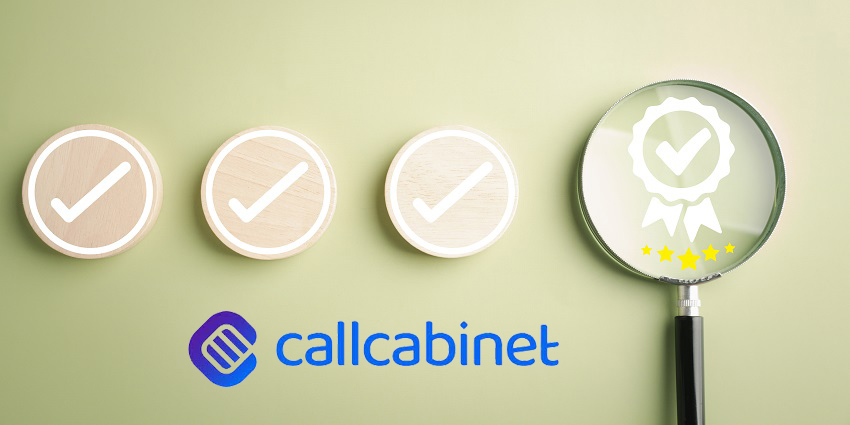Quality assurance (QA) tools aren’t a new concept for many business leaders. To deliver exceptional customer experiences, ensure compliance, and maintain high levels of productivity, companies in countless industries have long relied on QA systems. However, even in today’s highly competitive landscape, the true value of these tools is often overlooked.
While, in the past, many QA tools were designed primarily to ensure employees were adhering to corporate policies and interacting appropriately with clients, the solutions available on the market today have evolved. Innovative platforms with customisable call scoring tools and AI enhancements can provide access to a huge range of benefits beyond simple boosts in compliance.
With the right tools, business leaders can unlock the value of hidden, untouched data in their communication landscape, and use these insights to make powerful, data-driven decisions. The key to success is choosing a QA solution that opens the door to new opportunities.
Which Companies Rely on Quality Assurance Tools?
The benefits of QA and call scoring tools are often linked primarily to the contact centre. Within these customer-service environments, QA tools can help organisations understand, track, and map the customer journey with meaningful data and analytics. The right tools can help agents and supervisors alike pinpoint opportunities for process improvements and discover new ways of enhancing the customer experience.
However, QA and call scoring tools don’t just deliver value to contact centres. As companies in various landscapes continue to rely on data to make more intelligent, growth-led decisions, new use cases for QA solutions are also emerging. For instance, QA solutions can deliver value to:
- Trading desks: In the financial industry, trading desks can utilise QA tools and customisable call scoring solutions to track compliance, preserve client security, and discover new opportunities for revenue growth.
- Inside sales departments: Sales departments can leverage QA tools to discover new ways of increasing sales, competitive insights, revenue, and customer lifetime value. They can pinpoint which factors pave the way for cross-selling and upselling opportunities and drive process improvements for existing and new members of staff.
- Technical support departments: Technical support departments can use QA and scoring tools to identify the root cause of common technical problems and explore new ways of improving business productivity and innovation.
- Collection departments: Collection departments can leverage QA tools to ensure they’re staying compliant with crucial regulatory mandates, reducing the risk of hefty fines, penalties, and damage to brand reputations.
- Enhanced customer satisfaction: Timely and accurate claims processing is essential for customer satisfaction. QA solutions help to ensure that claims are handled efficiently and effectively, resulting in faster processing times, reduced errors, and improved customer service. This can lead to increased customer loyalty and positive word-of-mouth recommendations for the insurance company.
What to Look for in a Modern QA Solution
QA tools with customisable call-scoring solutions can deliver real business value to virtually any company. Call and interaction data can hold the secrets to endless opportunities for process improvements and growth for business leaders. However, to truly leverage the unique benefits a QA solution can offer, business leaders need to first ensure they’re accessing the tools with the right business-critical features and capabilities.
While there may be no one-size-fits-all strategy to choosing a tool for success, companies can improve their chances of driving rapid return on investment by looking for:
1. Automation
Manual QA solutions are time-consuming, frustrating, and often expensive to manage. While they can be valuable when they’re leveraged correctly, they’re prone to human error and inaccuracies and can have a negative impact on business productivity.
Switching to an automated solution, complete with next-generation AI capabilities, allows companies to minimise some of the common stresses associated with leveraging legacy QA tools. An automated ecosystem can analyse massive volumes of data in less time, delivering instant insights into ways companies can reduce costly error, improve productivity, and enhance customer experiences.
2. Artificial intelligence
Not only does artificial intelligence in the QA landscape save companies time through intelligent automation, but it can also enhance the value of the insights gathered from assurance tools. Leading QA and call scoring systems can use best-in-breed natural language processing capabilities to ensure every detail in a conversation is more accurately reviewed and recorded. Some tools even allow companies to embed their own custom vocabulary libraries into the AI ecosystem.
Innovative QA and call scoring tools can also provide internal insights into the nature of conversations, with sentiment and emotion analysis. Using AI algorithms, solutions can pinpoint the tone, pacing, and word choice of consumers and employees alike to reveal telling data discoveries.
3. Comprehensive customisation
The metrics which make or break a company’s chances of success can vary from one business to the next. That’s why it’s so important for business leaders leveraging QA tools today to look for a solution they can customise according to their specific needs. The right tools will allow team leaders to create custom agent scorecards for each employee, capable of monitoring relevant performance metrics.
Leading QA tools will also allow business leaders to determine which KPIs they want to monitor and go as far as integrating the performance data captured from calls with other valuable sources of information, into single-pane-of-glass dashboards for consolidated end-to-end reporting.
4. End-to-end coverage
As business communications and workflows continue to evolve, it’s becoming increasingly essential for businesses to be able to monitor and manage QA across multiple channels and environments. The best solutions work seamlessly with a range of tools and platforms for communications. Many systems even allow companies to leverage other value-added tools alongside their QA technology.
For instance, agent screen capture and recording tools combined with QA platforms can give business leaders and managers a more comprehensive picture of everything from policy adherence to compliance and overall agent performance.
5. Exceptional control
Finally, the best QA solutions should be frictionless for businesses to use and manage. Companies should have the freedom to leverage everything from granular search filters, to pinpoint useful information in conversations, to call categorisation tools.
With an easy-to-use and comprehensive solution, business leaders can unlock the true benefits of QA technologies for boosting workforce performance, preserving compliance, and enhancing customer experiences.
As Ryan Kahan, CEO of CallCabinet, explains: “Quality assurance and customisable call scoring tools can provide businesses with a range of benefits beyond simple boosts in compliance. Integrated QA and call scoring tools can deliver value to various departments from customer services to technical support, enabling companies to discover new ways of improving business productivity, innovation, and customer experiences. To leverage the unique benefits of a QA solution, businesses need to ensure they have access to tools with the right business-critical features and capabilities.
Find out more by visiting the CallCabinet website.







